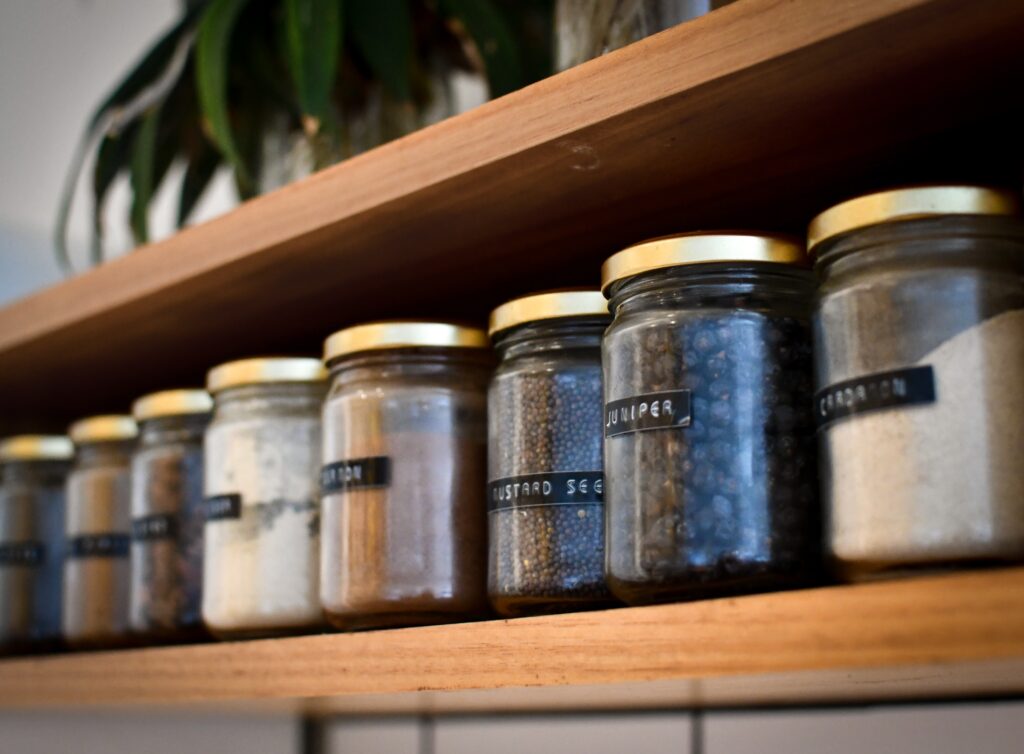
Looking for gluten-free, gut-friendly staples to stock your pantry? Here are five great ones to start with! These are versatile, delicious, and ready to support your gut health.
1. Beans
There are so many types of beans that you’re bound to find one you enjoy. As a staple in the gut-friendly pantry, beans are a fabulous source of protein and prebiotic fiber. Prebiotics are food for our gut microbes and therefore encourage the growth of beneficial bacteria. These beneficial bacteria support digestion and a healthy gut lining, and they can even help prevent or attenuate chronic diseases.
Often, people avoid beans out of the fear of getting bloated and gassy afterwards. Unfortunately, this becomes a self-fulfilling prophecy, as the longer we keep beans out of our diet, the more uncomfortable it becomes to add them back. It’s actually possible to “train” your gut to tolerate beans by introducing them in very small, daily amounts and slowly increasing servings. Be sure to also check in with your practitioner to rule out underlying gut dysbiosis if you have trouble with beans.
Beans are a cheap, accessible addition to any hearty salad, soup, stew, or taco night. You can even make brownies and blondies with them for a high-fiber dessert!
When buying beans, look for organic, if possible. If you get canned beans, look for BPA-free cans and make sure to drain and rinse them well. If you get dried, make sure to plan for ample time to soak before cooking. For most beans, this takes about 24 hours (be sure to change the water every ~8 hours).
2. Honey
Honey has been a staple item in many traditional cultures because of its versatility in dishes and its medicinal properties.
Honey is a gut friendly staple because it’s a prebiotic (how cool!) and includes digestive enzymes. Prebiotics provide fuel for beneficial bacteria to thrive.
Honey can be incorporated into a homemade vinaigrette, added into hot tea, or used in baked items. To buy a quality honey look for one that is raw, organic if possible, and with no added syrups such as glucose or fructose.
3. Curry powder
Curry powder is an anti-inflammatory spice mix that may contain coriander, cumin, turmeric, mustard, fenugreek, paprika, cardamom, nutmeg, cloves, and/or ginger. Many of these spices are “carminatives,” meaning they help relieve gas and bloating.
Turmeric and ginger are especially beneficial for gut and overall health. Ginger is one of the best herbs to relieve gas, bloating, and nausea. It also supports motility, and can be especially good for those with constipation. Turmeric is incredibly anti-inflammatory across the entire body and can promote beneficial bacteria in the gut.
Beyond making actual curry dishes, curry powder can be sprinkled on tofu, meat, or veggies before roasting or sautéing. It’s also great on popcorn!
4. Chia seeds
Chia seeds provide a combination of nutrients that keep you feeling full and support healthy digestion. These include fiber and anti-inflammatory omega-3 fats. The fiber in chia is a type of “soluble” fiber. It feeds beneficial gut bacteria, helps to balance blood sugar, and can regulate bowel movements (especially if you have constipation).
Chia seeds are a great addition to smoothies, baked goods, overnight oats and oatmeal, quinoa porridge, and yogurt. You can also make a chia pudding like this one or a pumpkin spice chia pudding.
5. Extra virgin olive oil
Extra virgin olive oil may be the ultimate pantry staple because of its versatile daily uses and well established health benefits.
Typically known for its heart-healthy effects, olive oil is also packed with plant compounds called polyphenols that our gut microbes love. These polyphenols have been shown to have a prebiotic-like effect on the microbiome by encouraging growth of beneficial bacteria and even improving the immune function in the gut (remember, most of your immune system is in the gut!).
Not all olive oils are created equal, however. Some are adulterated with other oils or are left on the shelves so long that they become rancid. Here are a few things to look for to help you select a quality olive oil:
- “Extra virgin”
- Cold-pressed
- Dark glass or metal bottle (to protect from light)
- Harvest date, if possible
- Organic, if possible
Olive oil can be mixed into dressings and sauces, drizzled over hummus or steamed veggies, or used for moderate-heat cooking (typically up to about 400 degrees F).
This list is just a few gut-supportive foods to get you started; there are so many more! Which one is your favorite?
